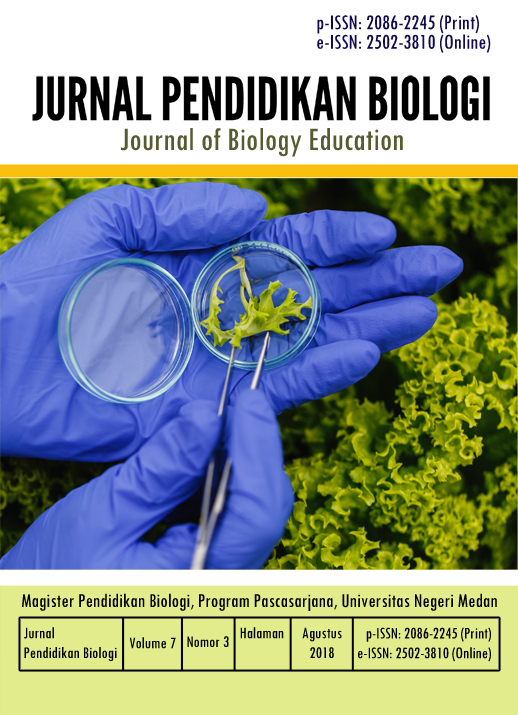Profil Keterampilan Literasi Sains Siswa di Salah Satu Sekolah Swasta di Karanganyar
DOI:
https://doi.org/10.24114/jpb.v7i3.10123Keywords:
Science Literacy, Program for International Student (PISA), high school studentsAbstract
This study aims to determine the profile of students' literacy skills in one of the private high schools in Karanganyar. This study uses a survey method. The study population was all high school students of class X, XI, and XII MIA. The sampling technique uses stratified proportional random sampling with a total sample of 45 students. Science literacy skills are measured using the 2015 Program for International Student (PISA) test with indicators developed by Gormally. The results showed that in general, the average value of students' scientific literacy skills was 52.22% in the deficient category. The results of each indicator of scientific literacy skills are as follows: (1) scientific opinion identification skills of 55.56% in the low category, (2) effective literature search of 48.89% in the very low category, (3) understanding the research design elements amounted to 37.78% in the very low category, (4) charted 57.78% in the low category, (5) solved the problem with quantitative skills of 53.33% in the very low category, (6) interpreted the statistics the base is 60.00% in the medium category, (7) inference, prediction and conclusion drawing 62.23% in the medium category.References
Adisendjaja, Yusuf Hilmi . (2007) . Analisis Buku Ajar Biologi SMA Kelas X di Kota Bandung Berdasarkan Literasi Sains. UPI. Bandung.
Arohman, M., Saefudin, S., & Priyandoko, D. (2016). Kemampuan Literasi Sains Siswa pada Pembelajaran Ekosistem. Prosiding Seminar Biologi, 13(1), 90“92.
Asyhari, A., & Hartati, R. (2015). Profil Peningkatan Kemampuan Literasi Sains Siswa melalui Pembelajaran Saintifik. Jurnal Ilmiah Pendidikan Fisika, 4(2), 179-191.
Basam, F., & Ani Rusilowati, S. R. (2018). Profil Kompetensi Sains Siswa salam Pembelajaran Literasi Sains Berpendekatan Inkuiri Saintifik. Pancasakti Science Education Journal, 3(1), 1-8.
Cintamulya, I. (2012). Peranan Pendidikan Dalam Mempersiapkan Sumber. Jurnal Formatif, 2(2), 90“101.
Dewi, F. (2015). Proyek Buku Didital: Upaya Peningkatan Keterampilan Abad 21 Calon Guru Sekolah Dasar Melalui Model Pembelajaran Berbasis Proyek. Metodik Didaktik, 9(2), 1“15.
Gormally, C., Peggy B., dan Mary L., (2012). Developing a Test of Scientific Literacy Skills (TOLS): Measuring Undergraduates˜ Evaluation of Scientific Information and Arguments. CBE-Life Sciences Education. Vol. 11, 364-377.
Hidayah, Ratna., Salimi, M., Susanti, T. . (2017). Critical Thinking Skill: Konsep Dan Inidikator Penilaian. Jurnal Taman Cendekia, 1(2), 127“134.
Horrigan J. (2006). The Internet as a Resource for News and Information about Science. (online)
MaKinster J.G, Beghetto R.A, Plucker J.A. (2002). Why can˜t I find Newton˜s third law? Case studies of students˜ use of the Web as a science resource. J Sci Educ Technol. Vol. 11, 155“172.
OECD. (2016). PISA 2015: Results in focus. Pisa 2015, (67), 16. https://doi.org/10.1787/9789264266490-en
Permanasari, A. (2010). œMembangun Keterkaitan antara Mengajar dan Belajar Pendidikan Sains SMP untuk Meningkatkan Science Literacy Peserta didik dalam Hidayat, T., Kaniawati, I., Suwarna, R. I., Setiabudi, A., & Suhendra, Teori, Paradigma, Prinsip dan Pendekatan Pembelajaran MIPA dalam konteks Indonesia. Bandung: JICAFMIPA UPI.
Purwanto, M.N. (2008). Prinsip-prinsip dan Teknik Evaluasi Pengajaran. Bandung: PT Remaja Rosdakarya
Rahayuni, G. (2016). Hubungan Keterampilan Berpikir Kritis dan Literasi Sains Pada Pembelajaran IPA Terpadu dengan Model PBM dan STM. Jurnal Penelitian dan Pembelajaran IPA, 2(2), 131-146.
Rizkita, L., Suwono, H., & Susilo, H. (2016). The Analysis Of Initial Ability Of Student™s Scientific Literacy In High School In Malang. Prosiding Seminar Nasional II Tahun, (2), 771“781.
Silitonga, P., & Mara Bangun, D. (2016). Pengaruh Model Pembelajaran Inquiry Training dan Kreativitas terhadap keterampilan Proses Sains. Jurnal Pendidikan Fisika, 5(1), 44-50.
Windyariani, S. (2017). Kemampuan Literasi Sains Siswa Sd Pada Konteks Melestarikan Capung. Jurnal Pendidikan Biologi, 10(1), 17“21.
Wulandari, N., & Sholihin, H. (2016). Analisis Kemampuan Literasi Sains Pada Aspek Pengetahuan dan Kompetensi Sains Siswa SMP Pada Materi Kalor. Edusains, 8(1), 66“73. https://doi.org/10.15408/es.v8i1.1762
Published
Issue
Section
License
Copyright (c) 2018 Jurnal Pendidikan Biologi

This work is licensed under a Creative Commons Attribution 4.0 International License.
Copyright
Penyerahan naskah menyiratkan bahwa karya yang diserahkan belum pernah diterbitkan sebelumnya (kecuali sebagai bagian dari tesis, laporan, atau abstrak). Naskah tidak dipertimbangkan untuk publikasi di tempat lain. Penerbitannya telah disetujui oleh semua penulis bersama. Jika dan kapan naskah diterima untuk publikasi, penulis masih memegang hak cipta dan mempertahankan hak penerbitan tanpa batasan. Penulis atau orang lain diperbolehkan untuk melipatgandakan artikel selama tidak untuk tujuan komersial. Untuk penemuan baru, penulis disarankan untuk mengelola patennya sebelum diterbitkan.
Open Access
Jurnal ini berkomitmen untuk membuka akses bebas yang tidak membebankan biaya kepada pembacanya atau lembaga mereka. Pembaca berhak membaca, mengunduh, menyalin, mendistribusikan, mencetak, mencari, atau menautkan ke teks lengkap artikel, selama tidak untuk tujuan komersial. Jenis lisensi adalah CC-BY-4.0.
Disclaimer
Tidak ada tanggung jawab yang dikenakan kepada Penerbit atau oleh editor untuk kesalahan dan/atau kerusakan pada naskah sebagai akibat dari pernyataan pencemaran nama baik atau dugaan pencemaran nama baik, pelanggaran hak kekayaan intelektual atau privasi, atau kewajiban produk, baik akibat kelalaian atau sebaliknya, atau dari penggunaan atau operasi ide, instruksi, prosedur, produk atau metode apa pun yang terkandung dalam materi di dalamnya.

